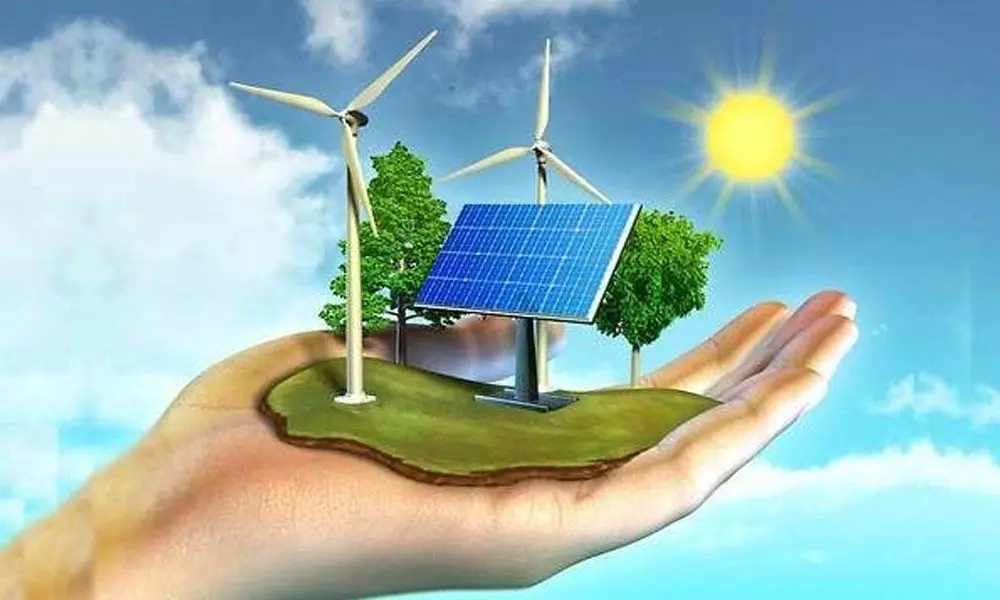Climate change poses an existential threat with the
potential to alter the course of human history for the worse. Traditional
energy sources, specifically fossil fuels, stand as the primary culprits behind
climate change, responsible for over 75% of global greenhouse gas emissions and
approximately 90% of carbon dioxide emissions.
To secure a better future, India must embrace green energy
as the key solution to achieve its net-zero emission target by 2070. In this
pursuit, India should set an example by pioneering a novel model of economic
development that steers clear of carbon-intensive approaches, serving as a
blueprint for other developing economies looking to transition to clean energy.
What Is Green Energy?
Green energy, also
known as clean, sustainable, or renewable energy, derives from sources that are
replenishable and environmentally friendly. It doesn't release harmful
greenhouse gases, minimizing its impact on the environment. Key green energy
sources encompass solar power, wind energy, geothermal energy, biogas,
low-impact hydroelectricity, and select biomass sources.
India's Initiatives for Green Energy Transition India,
ranking as the world's third-largest energy consumer, has witnessed a doubling
of energy use since 2000, with 80% of this demand met by coal, oil, and solid
biomass.
Efforts Towards Green
Energy Transition:
India announced in 2019 its commitment to increase renewable
energy capacity to 450 GW by 2030.
The Production Linked Incentive Scheme (PLI) bolsters the
manufacturing sector for renewable energy raw materials.
The PM-KUSUM initiative aims to harness 25,750 MW of solar
energy by 2022, ensuring financial and water security for farmers.
The solarization of water pumps brings distributed power to
consumers' doorsteps.
The Ministry of New and Renewable Energy hosts the Akshay
Urja Portal and India Renewable Idea Exchange (IRIX) Portal, fostering idea
exchange among energy-conscious individuals.
Other Initiatives
Shaping India's Energy Transition:
Pradhan Mantri Sahaj Bijli Har Ghar Yojana (SAUBHAGYA)
Green Energy Corridor (GEC)
National Smart Grid Mission (NSGM) and Smart Meter National
Programme
Faster Adoption and Manufacturing of (Hybrid &) Electric
Vehicles (FAME)
International Solar Alliance (ISA)
Challenges in India's
Energy Sector
Energy Poverty and
Inequality: Widespread disparities in energy access persist, with millions
of households still relying on non-clean sources for lighting, particularly in
rural areas.
Import Dependence and
Supply Chain Vulnerability: India faces challenges due to its reliance on
imported oil and foreign countries for solar modules, with geopolitical
tensions complicating supply chain dynamics.
Climate
Change-Induced Energy Crisis: Climate change exacerbates existing energy
challenges, affecting energy infrastructure and fuel supply.
Women's Health at
Risk: The use of non-clean energy sources places women at risk of health
issues due to household responsibilities and exposure to harmful resources.
Coal Demand-Supply
Gap: The demand-supply gap for coal is widening due to factors like
unresolved contractual issues and rising prices.
Increasing Energy
Demand and Costs: Rising urbanization and industrialization in India have
led to growing energy demand, coupled with increasing global petroleum costs.
The Way Forward
Empowering Women in
the Energy Sector: Encouraging women's participation and leadership in the
energy sector can expedite the transition to a low-carbon economy.
Diversifying Green
Supply Chains: Expanding clean energy supply chains to a wider range of countries
and managing the shift in revenues and employment is crucial.
Incentivizing
Low-Cost Energy Solutions: Encouraging innovations at the university level
and promoting research and innovation in the clean energy sector can utilize
India's demographic dividend.
Focusing on Green
Transport: Prioritizing public transport, emission norms, biofuels, and
electric vehicles is essential.
Multisectoral
Approach to Energy Transition: Addressing energy resilience on various
fronts, urban development, industrial growth, and supply chain management can
promote self-sufficiency and global competitiveness in the green energy sector.
Embracing Circular
Economy Solutions: Incorporating circular economy principles with green
energy will be a central feature of India's future economy.

